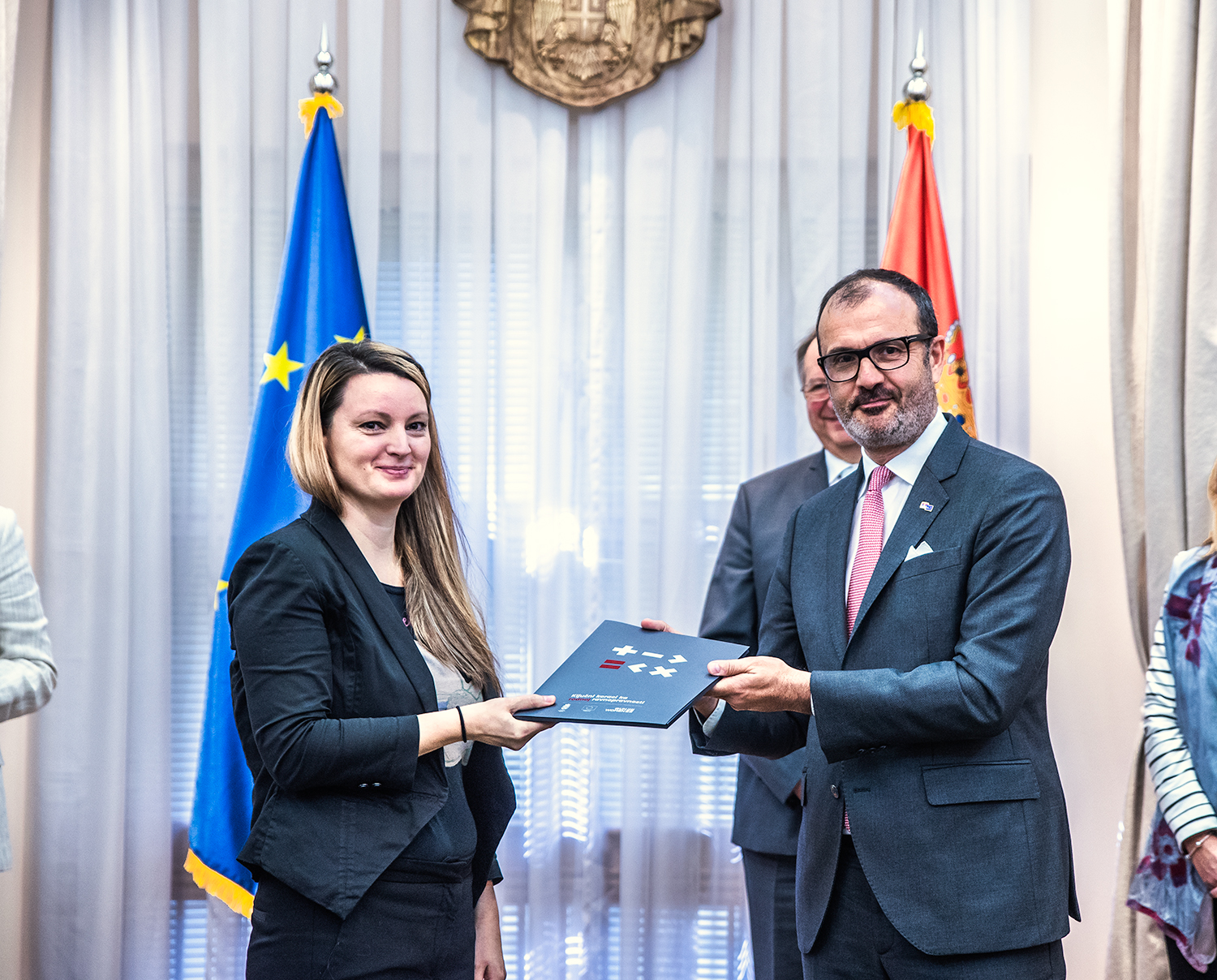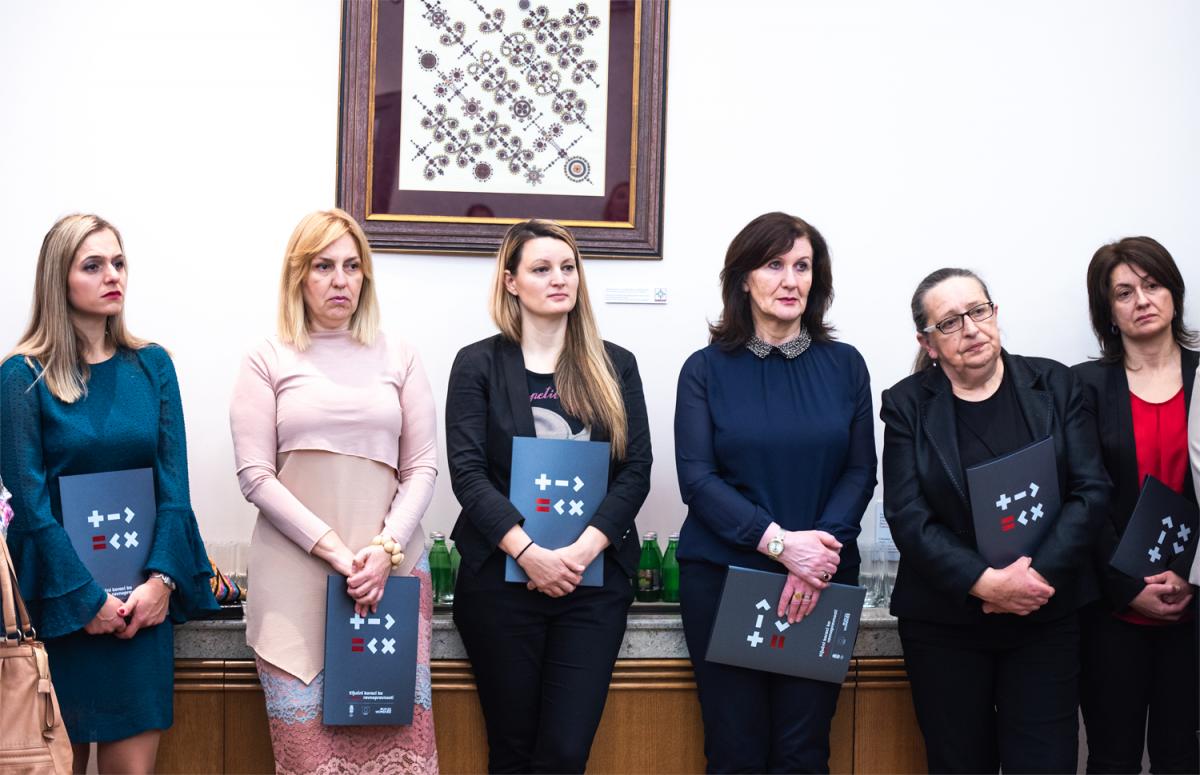Hotline: +381 61 63 84 071
Atina awarded with a contract for realization of the project “Key steps toward gender equality"

Photography: Marija Piroški
His Excellency Sem Fabrizi, Ambassador and head of European Union Delegation in Serbia presented Jelena Hrnjak, programme manager of Citizens' Association Atina, a contract for realization of a project in the field of gender equality and empowerment of women, within the project "Key steps toward gender equality", which is financed by the European Union. The project is part of the initiative for supporting women entrepreneurship, women in rural areas, decreasing labor market and employment discrimination, encouraging dialogue on the importance of economic empowerment of women and exchange of knowledge and information among women entrepreneurs.
UN Women – United Nations Entity for Gender Equality and the Empowerment of Women, in cooperation with the Gender Equality Coordination Body of the Government of the Republic of Serbia, and with the financial support of the European Union, supports the strengthening of the institutional framework for gender equality in the Republic of Serbia.
Within the project "Key steps toward gender equality", eight local self-governments and 16 citizens' associations have been supported to improve economic status of women and support local communities in meeting their obligations toward gender equality.

Personal opinion of His Excellency Sem Fabrizi, Ambassador and head of European Union Delegation in Serbia on gender equality can be read below:
GENDER INEQUALITY AND VIOLENCE AGAINST WOMEN ARE TWO SIDES OF THE SAME COIN. THESE SHOULD BE FOUGHT EQUALLY AND URGENTLY. WE CANNOT TACKLE ONE AND NEGLECT THE OTHER, BECAUSE WE WILL NOT GET SUSTAINABLE AND LIFE-CHANGING RESULTS
The lives of millions of women and girls around the world are being stunted or halted by violence in their everyday life. Much of this violence happens at home, so for many of them there is nowhere to escape, nowhere to run to. A place you call home, which should be your refuge in times of trouble, can be where you are most vulnerable.
Gender inequality and violence against women are two sides of the same coin. These should be fought equally and urgently. We cannot tackle one and neglect the other, because, we will not get sustainable and life-changing results.
Discrimination based on gender, sexual harassment and gender-based violence are questions of human rights. How we address these problems reveals whether we live in a fair and just society.
But access to justice is another major challenge such that even where laws are supposed to protect women and to prosecute violence and discrimination against women, many women fail to receive the justice they deserve.
Women and girls who experience multiple and intersecting forms of discrimination face far greater levels of vulnerability, marginalization and resulting violence. This especially goes for women with disabilities, women from minority groups, rural women, as well as women whose sexual orientation someone decides is not acceptable.
Tolerance for any aspects of gender inequality, including violence against women, implies a narrative that considers it acceptable to oppress half of society, while life goes on as if nothing has happened.
It is imperative to change that narrative, involving the society in its entirety, to mobilise a coalition of the forces which make change possible.
Over the last 60 years, societal changes and consistent policies have set a trend towards gender equality.
The European Union has always been a major force behind these developments, continuing to play an important role to maintain momentum and build on past achievements.
Equality between women and men is a fundamental value of the European Union, one that has been enshrined from the very beginning. The Treaty of Rome (1957) included a provision calling for equal pay for equal work.
In the last constitutional reform (Lisbon Treaty) the Union and its Member States committed to combat all kinds of domestic violence […], to prevent and punish these criminal acts and to support and protect the victims’.
Agreements, conventions, and laws provide the key regulatory framework, the system to have recourse, but action is needed to implement these.
Gender equality will need to be translated into everyday life and we must work to ensure that things change for the better.
This is why the EU is supporting the changes towards gender equality in EU candidate countries like Serbia.
Serbia as any modern society, sharing the same values and aspiration to gender equality as the rest of the EU family, is adopting a number of steps with the full support of the EU.
In partnership with UN Women, the EU Delegation in Serbia is now implementing a three-year project entitled “Priority Action for Gender Equality”.
The aim is to strengthen administrative capacities for gender equality and achieve significant progress in implementation of EU and national gender equality commitments through gender mainstreaming.
This project will firstly strengthen the institutional capacities of the Coordination Body for Gender Equality by ensuring that administrative structures, adequate and well-trained staff and management systems are being put in place.
The second pillar of the project provides support to the Ministry of European Integration in mainstreaming a gender perspective in development of national policy and strategic framework, programming of national and EU funds as well as implementation and monitoring of programmes and projects.
The third pillar of the project aims for implementation of specific measures contributing to the empowerment of women in the labour market, women’s entrepreneurship and the empowerment of rural women, through awarding of at least 30 grants to women’s Civil Society Organizations (CSO). To date, grants have been awarded to eight women CSOs to implement measures and share experiences and good practices in the implementation of measures of the National Action Plan on Gender Equality.
Grants have also been awarded to eight Local Gender Equality Mechanisms to implement Local Action Plans for gender equality on implementation of measures and activities from adopted Local Action Plan on Gender Equality. This way they will tackle different areas: the status of women in the labour market; women’s entrepreneurship; and economic empowerment of rural women. And they will work for the promotion and implementation of the European Charter for Equality of Women and Men in Local Life.
In addition, the EU agency – European Institute for Gender Equality (EIGE) – provides technical expertise to Serbia to incorporate a gender perspective into policy-making on its way towards EU membership. This includes improving the collection of gender statistics and especially data on gender-based violence and the protection of victims, in line with the implementation of the Istanbul convention. This year, EIGE is helping with the development of national Gender Equality Indices in the region. .
It is very noticeable that Serbia was the first among acceding countries to develop and launch its Gender Equality Index in 2016. It is the first non-EU country to replicate EIGE’s Index, enabling a comparison with the EU and its Member States.
To paraphrase Global Goodwill Ambassador of UN Women Emma Watson, promoting “HeForShe agents of change”, to end gender inequality we need everyone involved.
In Serbia, as elsewhere, action is needed, every day from each and everyone to bring changes at home, office, in the communities, and municipalities, and step it up towards full gender equality by 2030 as called for by “Planet 50-50.”
Gender equality is a prerequisite for the sustainable development of our societies as a whole.
Author is an Ambassador and head of European Union Delegation in Serbia.
This text was produced in the framework of the project "Support to Priority Actions for Gender Equality in Serbia", implemented by the United Nations Entity for Gender Equality and the Empowerment of Women (UN Women) with funding from the European Union. The views contained in the text are those of the authors and do not necessarily represent the views of UN Women, the United Nations or any of its affiliated organizations. The project is part of the initiative for supporting women entrepreneurship, women in rural areas, decreasing labor market and employment discrimination, encouraging dialogue on the importance of economic empowerment of women and exchange of knowledge and information among women entrepreneurs.












 FACEBOOK
FACEBOOK TWITTER
TWITTER YOUTUBE
YOUTUBE